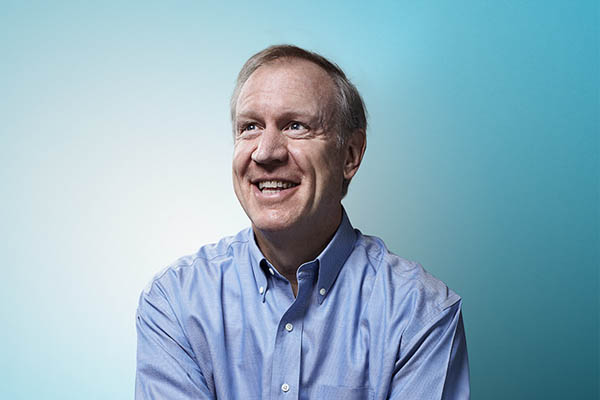Republican venture capitalist Bruce Rauner, 57, announced Wednesday that he was joining the race for governor of Illinois in 2014. You can watch his introduction video here. Chicago had a chance to speak with Rauner, one of the 100 Most Powerful Chicagoans, in advance of his announcement.
Why are you running for governor?
I was born and raised here [in Deerfield], and I can’t stand watching us go down the drain. I’ve been engaged in civic activities for a long time, and about five years ago, I was encouraged to run by folks in the business community. We evaluated it as a family—my wife [Diana, 51, the president of the Ounce Prevention Fund] and kids [six of them, ages 15 to 29] and I—and decided that it didn’t work timewise. Since then, [the state’s] problems have gotten worse. I can’t sit back and watch.
You ran one of Chicago’s biggest private equity firms, GTCR, for years. How does that prepare you to be governor?
Being a successful CEO, where I’ve driven a bottom line, assembled teams, driven results, that’s a critical benefit to running the state government. A CEO’s job is leadership, problem solving, and team building. I’ve done that my whole career.
How would you fix Illinois’s serious problems, such as its fiscal condition and high unemployment?
We have to reduce the tax burden, whether it’s income tax for corporations or private individuals, and we should put a freeze on property taxes. It’s going to take a strategic assessment of the overall tax policy to find out ways we can be more pro–job creation, while still raising enough money for the disadvantaged.
As the former head of Choose Chicago, the city’s tourism bureau, what do you think of the plans for a new DePaul stadium?
We should be investing in our visitor industry aspects. I believe, though, that taxpayers shouldn’t be funding much of that. A great deal of that should be funded by the private sector.
Which governors do you admire?
Mitch Daniels in Indiana was the best governor in America for eight years. I’ve gone to Indianapolis to study with him. Rick Snyder in Michigan, who’s a venture capitalist just like I’ve been. Rick Scott in Florida is very strong. Jeb Bush is terrific; I’ve talked with him on education reform. Scott Walker in Wisconsin has done good things to improve the economy and tax burden [there].
Those are all Republicans. Are there any Democratic governors you like?
I tend to think that free-market conservative principles are the best ones for the CEO of a state. . . . Ronald Reagan helped me become a Republican. My wife is an avid Democrat [concerned with] helping the disadvantaged. I’ve completely lost faith in the Democratic Party to truly serve the disadvantaged.
What is your relationship with Rahm Emanuel like?
He and I have known each other for a long time. We argue a lot; we differ. But we have mutual respect for each other.
What do you think of Chicago Teacher’s Union president Karen Lewis?
I don’t have a problem with Karen personally. She’s doing her job well—too well. We have to understand that the agenda of union bosses is not the agenda of taxpayers. When the union has the nuclear weapon of a strike—when they hold that threat over the community—that’s untenable.
Did Mayor Emanuel cave to the union too much during last year’s strike?
We didn’t come out of that where we should have. We didn’t improve the system structurally. Teachers should be put on merit pay rather than tenure. I don’t think tenure makes sense. [Nobody] should have a job for life.
You made headlines in April with a story that in 2008 you asked then–CPS chief Arne Duncan to enroll your daughter in Walter Payton College Prep, the most competitive public high school in the city.
There’s no substance to it at all. We didn’t do anything inappropriate whatsoever. Our daughter is a terrific student—top grades, top test scores—but she missed a few weeks of school because of pneumonia. She was a perfect candidate for the principal’s discretion list. [Principals of Chicago’s 10 selective enrollment high schools may fill up to 5 percent of seats using their own criteria.]
You’ve said you don’t remember calling Duncan. Is that what you still say today?
I don’t remember who talked to whom. Arne, [former CPS CEO] Ron Huberman, [former CPS CEO] Paul Vallas, and I—we talked all the time because [my wife and I] had been very engaged in school reform. We have given millions of dollars and countless hours trying to improve the public education system.
Are you going to self-finance your campaign?
I’m willing to invest in myself and our campaign as much as necessary.
The number $50 million has been floated.
I don’t know where that number comes from, but it doesn’t come from me.
This interview has been condensed and edited. The rest of the interview is available here.




